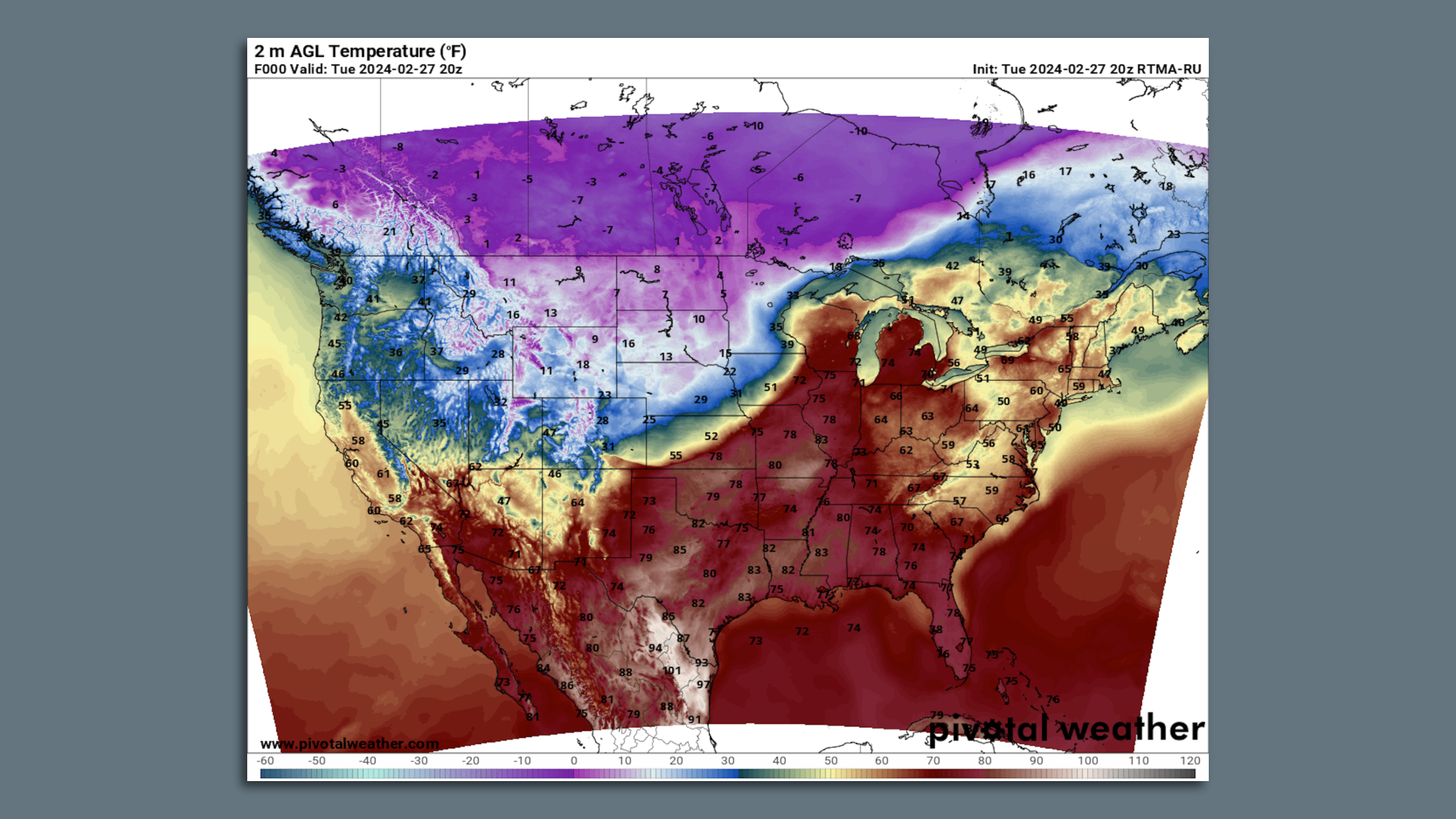February 29, 2024
🤯 Wow is there a lot happening. We've got you covered with a Smart Brevity count of 1,262 words, 5 minutes.
🚨 Breaking: The White House this morning announced a new probe into security risks posed by "connected" vehicles from China.
- Why it matters: It could bring fresh barriers to China pushing into the U.S. electric car market. The NYT has more.
🎶 Exactly 45 years ago, Chuck Brown & the Soul Searchers were No. 1 on Billboard's soul charts with today's intro tune...
1 big thing: Mapping climate risk by country tells a sobering global tale

This chart ☝️is just one part of sobering research about how climate change-worsened extremes threaten specific nations, Ben writes.
Why it matters: The new analysis in Climatic Change offers fresh insight into risks facing six countries at different levels of warming — Brazil, Ghana, Ethiopia, China, Egypt and India.
- "Since important decisions about climate change mitigation and adaptation are made at the national scale, national scale outputs are needed for informing policy," lead author Rachel Warren, of the University of East Anglia, said in a statement.
The big picture: Researchers explored crop losses, biodiversity, flooding and drought exposure, and more if the world stays within the 2015 Paris Agreement guardrails — or blows past them.
- Paris calls for limiting temperature rise to 1.5°C above preindustrial levels (a goal that's either slipping away fast or already gone, depending on who you ask), with a fallback of under 2°C.
Threat level: At 3°C, over 50% of the agricultural land in each country studied is projected to face severe droughts over one year during a 30-year stretch, a summary notes.
- But at 1.5°C, "reductions in exposure of agricultural land to severe drought are 61%, 43%, 18%, and 21% lower in Ethiopia, China, Ghana, and India, respectively," the paper states.
- Other risks are immense too, like biodiversity loss.
The bottom line: These threats aren't isolated. Co-author Jeff Price of UEA notes that while they looked at six countries, "other nations are projected to experience similar issues."
2. Exxon draws K Street allies in key shareholder case

Illustration: Aïda Amer/Axios
The U.S. Chamber of Commerce and the Business Roundtable hope to join Exxon's litigation against shareholder climate activists, Ben writes.
Why it matters: It signals that the K Street powerhouses see this case as an important front in wider battles over shareholder activism on climate and other topics.
State of play: The groups yesterday asked a Texas federal judge to accept an amicus brief that says the SEC makes excluding resolutions too hard.
- "By opening the door to shareholder proposals pushing social and political agendas, the SEC has allowed a subset of activists to commandeer corporate proxy statements for their own parochial ends," it states.
- They say this is expensive and diverts time from "proper consideration of genuine proposals."
Catch up quick: Last month, Exxon sued Arjuna Capital and the group Follow This over a resolution seeking more expansive emissions targets.
- The activists have moved to dismiss the case now that they've abandoned the resolution and vowed not to re-file it.
- They accuse Exxon of trying to bully and silence advocates of tougher climate action.
- Exxon argues the case should continue because SEC's interpretation of its rules is allowing resolutions "designed to disrupt" business and "harm" shareholders.
The bottom line: K Street has entered the chat.
3. Bonus litigation news: crypto and beef
/2024/02/29/1709169658407.gif?w=1920)
Illustration: Brendan Lynch/Axios
👀 A resolution appears at hand in litigation over Energy Department efforts to collect data on digital currency miners' power use, Ben writes.
- What's new: A Texas federal judge yesterday wrote that the parties report an "agreement-in-principle" on the "underlying disputes."
- State of play: That's part of an order canceling a preliminary injunction hearing that was slated for Wednesday. It instructs the parties to "memorialize" their agreement by March 1.
- Catch up quick: DOE's Energy Information Administration recently sought to launch an "emergency" survey, citing concerns about strained grids, power prices and emissions.
- Yes, but: The Texas Blockchain Council and bitcoin miner Riot Platforms filed suit last week, alleging "contrived" urgency and "invasive government data collection."
🥩 Via the NYT, "The New York attorney general, Letitia James, on Wednesday sued JBS USA, the American arm of the world's largest meatpacker, accusing the company of making misleading statements about its efforts to reduce greenhouse gas emissions."
4. "Insane" winter heat wave topples records

Map showing the surge of record warm air (red) and cold air (blue/purple) behind it on Feb. 27, 2024. Image: Pivotal Weather
More than 130 monthly high-temperature records were set from Texas to Michigan, Andrew writes.
Why it matters: The historic winter heat wave illustrates how extreme day-to-day weather patterns can interact with climate change to set new milestones.
Driving the news: The heat began to build Monday, when more than 70 temperature records were toppled, many of them monthly milestones.
- For example, Omaha (80°F), Des Moines (78°F), Minneapolis (65°F) and Abilene, Texas (94°F), saw their hottest winter temperatures on Monday.
- Warm, humid air surged from Texas to Wisconsin Monday into Tuesday, toppling all-time February highs, such as 72°F in Milwaukee and 70°F in Madison.
What they're saying: "Nothing like this had ever happened," weather records tracker Maximiliano Herrera said on X, noting the record-shattering event felled state high-temperature records for February in six states during the course of just two days.
What's next: How about 140 inches of snow (or more) in 4 days? That's forecast starting today in a rare Sierra blizzard.
5. The storm before the storm on the SEC climate rule

Photo illustration: Shoshana Gordon/Axios. Photo: Andrew Harrer/Bloomberg via Getty Images
There's a frenzy of 11th-hour efforts to sway imminent Securities and Exchange Commission climate disclosure rules, Ben writes.
Why it matters: The long-simmering regulation will shine more light on public companies' emissions and how they view climate risk.
- The SEC just scheduled a March 6 vote on the mandates.
Behind the scenes: Recent days have brought discussions between SEC Chairman Gary Gensler (or commissioner Caroline Crenshaw), NGOs and lawmakers.
- They include Democratic Sens. Elizabeth Warren and Tina Smith and Democratic Rep. Maxine Waters.
- It's the latest in a huge number closed-door huddles over two years between SEC members and various parties.
Friction point: Much of the ferocious lobbying centers on whether companies must disclose emissions from supply chains and end-use of their products — called "Scope 3."
- Oil companies and other powerful industry voices oppose it, while it's a priority for climate groups.
- Published reports suggest the regulator plans to drop Scope 3 requirements.
What's next: More battles, because litigation is all but guaranteed.
6. What Mitch McConnell's exit means for energy

Illustration: Maura Losch/Axios
The race for Senate GOP leader could shape energy and climate policy in Congress for years — maybe decades, Axios Pro's Jael Holzman and Nick Sobczyk report.
What's next: Sens. John Thune, John Barrasso and John Cornyn are the most likely successors for Mitch McConnell, who announced he's exiting leadership in November.
Between the lines: All three tout GOP boilerplate on energy but bring different backgrounds that could sway their posture in McConnell's gig.
- Thune's state of South Dakota is a big ethanol producer but also has a burgeoning wind and hydropower contingent.
- He teamed up with Democrats to try to shape implementation of the IRA's sustainable aviation fuel credit.
Then there's Barrasso of Wyoming, a coal and nuclear state. He's quite experienced on energy as former environment committee chair and current ranking member on the energy committee.
The intrigue: Cornyn is more of a wild card. The Texan is an oil-and-gas guy but also joined bipartisan efforts to bolster hydrogen.
Unlock the whole story — and a steady diet of scoops and smart analysis — by talking to our sales team about Axios Pro: Energy Policy.
7. Catch up quick on tech finance

Illustration: Annelise Capossela/Axios
📈 U.S. investment in "clean" energy and transportation reached fresh records of $67 billion in Q4 last year and $239 billion for all of 2023, Ben writes.
- Why it matters: The latest data, via the Rhodium Group and MIT, shows how expanded federal subsidies and private sector investments are fueling a domestic boom.
🚛 The EPA is preparing to dole out roughly $3 billion to fund zero-emissions equipment and infrastructure at U.S. ports.
- Why it matters: Ports, with all their diesel trucks and other heavy equipment, are big CO2 sources and air pollution hot spots.
- What's next: The agency just launched a nearly $2.8B grant competition and a smaller ($150M) air quality planning grant process. Both are funded via the 2022 climate law.
📬 Did a friend send you this newsletter? Welcome, please sign up.
🙏 Thanks to Chris Speckhard and Javier E. David for edits to today's edition, along with the brilliant Axios Visuals team.